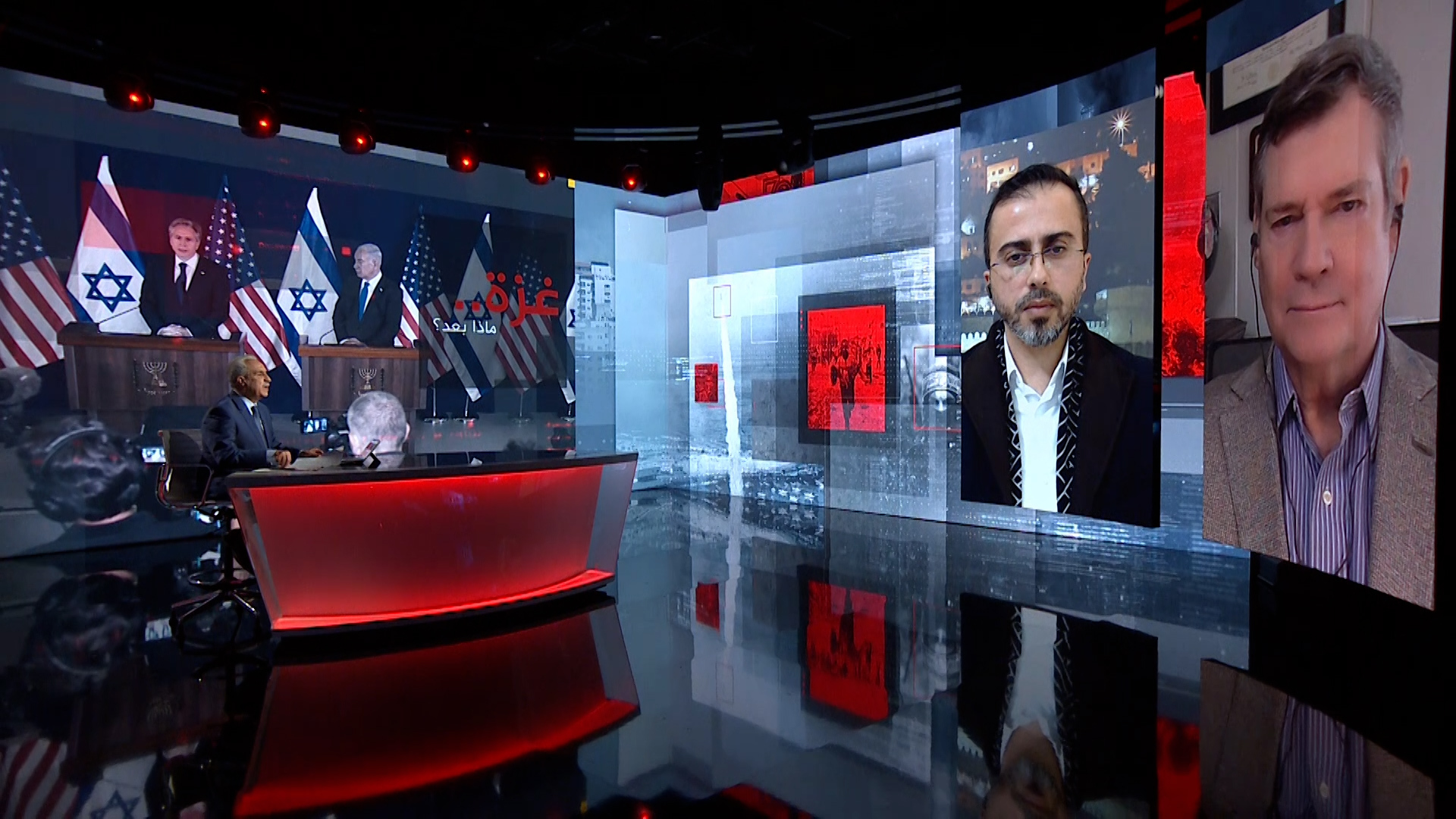play videoplay video
Video duration: 29 minutes 17 seconds 29:17
Two political analysts agreed that the US administration has become convinced that there is no longer room to override the position of the Islamic Resistance Movement (Hamas) in the context of seeking to end the war in the Gaza Strip, and that it must respond to its response regarding the prisoner exchange deal.
Despite the gap in the position between Hamas and Israel regarding the appropriate formula for a ceasefire and prisoner exchange, US Secretary of State Anthony Blinken spoke about the possibility of an agreement between the two parties and providing an appropriate basis for continued negotiation.
Blinken - who met with Israeli leaders - said that there is still room for an agreement between Israel and Hamas, adding in a striking indication that Hamas’ response, although unacceptable in some aspects, nevertheless provides what he described as a basis for negotiation.
During his participation in the program “Gaza... What’s next?”, Dr. Bilal Al-Shobaki, head of the Department of Political Science at Hebron University, said that the American position’s indicators appeared even before Blinken arrived in Tel Aviv, and this may have been the result of effective communication with Israeli leaders regarding the next stage.
Al-Shoubaki believes that Washington, through recent data, has formed a conviction that the course of negotiations with Hamas is no longer a possibility but has become inevitable, and this was reinforced by the statements of Israeli officials, including the Minister in the War Council, Benny Gantz, who spoke about the necessity of reshaping the Israeli war priorities.
Polls
This is also supported by opinion polls in the Israeli street, which showed that more than half of them supported a deal with Hamas, which will encourage political parties to speak louder in support of going to a deal despite the occupation Prime Minister Benjamin Netanyahu’s insistence on his high-level statements.
The head of the Department of Political Science at Hebron University points out that many reports indicate that the Israeli political level is no longer convinced at this stage with the goal of achieving complete victory according to Netanyahu’s vision, and that it is necessary to go to negotiations.
But what embarrasses the occupation leaders and pushes them to make these statements expressing complete rejection of Hamas’ response - according to Al-Shoubaki - is that it is based on the necessity of a permanent ceasefire, which means ending the military operation, stressing at the same time that even if Hamas’ conditions were lower, these statements were not To differ.
Al-Shoubaki expects that the Israeli War Council meeting - which discusses Hamas' response - will come out with a more stringent formula, in an attempt to prove that Israel still has the upper hand, and so that this position is consistent with the repeated sharp statements regarding the war in the Gaza Strip.
Reason for optimism
In turn, former US State Department diplomat Charles Dunn believes that the justification for Washington's optimism about the possibility of reaching an agreement between Hamas and Israel is the arrival of a Hamas delegation to Cairo to continue negotiations, and Netanyahu's failure to close the door to the negotiation process despite his announcement of his rejection of the movement's conditions.
This was considered encouraging for the US administration to continue its diplomatic efforts by working with the mediating parties - especially Qatar and Egypt - in addition to continuing talks with the Israelis to maintain this supportive momentum for negotiation until an agreement is reached.
Dan points out that a large number of observers have come to believe that Hamas cannot be eliminated, and that this goal cannot be achieved, and therefore an agreement must be reached that leads to putting an end to the war and ending the crisis in the region.
The former American diplomat continued that his country's position on the necessity of a political horizon that includes the existence of a Palestinian state began to take shape weeks ago, but it includes a perception that there will be no Hamas in power, strengthening the presence of the Palestinian Authority, and supporting elections at a certain stage that support this presence.
He adds that the United States believes that it is possible in the short term to reach some form of agreement on the exchange of prisoners and the delivery of humanitarian aid to the Gaza Strip, which Israel is obstructing from entering, especially to the northern parts of the Strip, which could ultimately lead to progress in other files.
Dan believes that Israel seeks, through its pressure, to have Hamas give up its stay in power after the war, to accept some form of arrangements that do not necessarily lead to a permanent ceasefire, and not to be obligated to release all Palestinian prisoners.
Source: Al Jazeera

